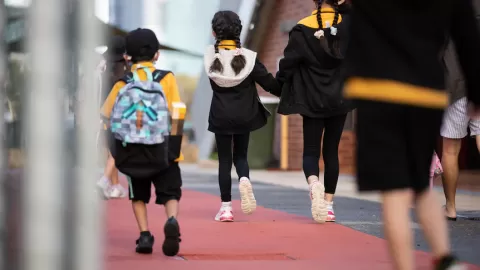
Australia is set to develop a national autism strategy regardless of who wins the federal election — a move that has been welcomed as a "good start" to changing community attitudes ;to children and young people with a disability.
Key points:
- A parliamentary committee recommended an autism strategy after examining services, support and life outcomes for people with the condition
- Both Labor and the Coalition have committed to introducing a strategy if elected on May 21
- Advocates say a national strategy is a good start but more needs to be done
Earlier this year, a parliamentary committee that examined the services, support and life outcomes for people with autism recommended the establishment of a national strategy.
Social Services Minister Anne Ruston announced on Saturday that the Coalition would commit $1 million towards a strategy over the next 12 months if re-elected.
It would be aimed at providing better access to services, increasing awareness and helping people into work.
Labor has already announced it would develop a national autism strategy if elected, as part of its broader policy on the National Disability Insurance Scheme.
Senator Ruston said one in every 30 school-aged Australian children were on the autism spectrum, and many of those children experienced loneliness, isolation, exclusion and discrimination.
"This comes at an enormous personal, social and economic cost to these Australians and their families," she said.
"For too long, people on the autism spectrum and their families have been left to navigate services to cater for their needs. This strategy will help better integrate services that change lives.
The Coalition's strategy would investigate how to better integrate federal and state autism services, and consider a public education campaign to portray the diversity of the autism spectrum, and improve inclusion in schools, workplaces and the community.
It would also look to identify workforce gaps and shortages, and would include reporting mechanisms on the social inclusion of people with autism in the community.
Mary Sayers from Children and Young People with Disability Australia said strong government investment was needed to change community attitudes.
"Children and young people with disability face discrimination and exclusion across many elements of their lives especially in their education," she said.
New South Wales Liberal senator Hollie Hughes chaired the parliamentary committee and said an additional $1.3 million would go to the Autism Cooperative Research Centre.
"From diagnosis through to adulthood, we want to provide the right supports for the 200,000 Australian people with autism," Senator Hughes said.
Labor's Tanya Plibersek said it was important to do whatever was possible to support families with children with autism.
"I speak to parents of children with autism a lot, and the most common thing they tell me is they struggle … to get their children recognised by the National Disability Insurance Scheme," Ms Plibersek said.
"Labor will always support more help for kids with autism, for their families, through the NDIS, through the school system.
"In any way that we can take some of the pressure off those families, we're up for it."